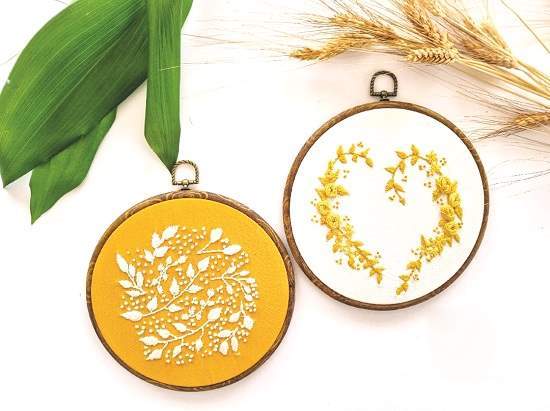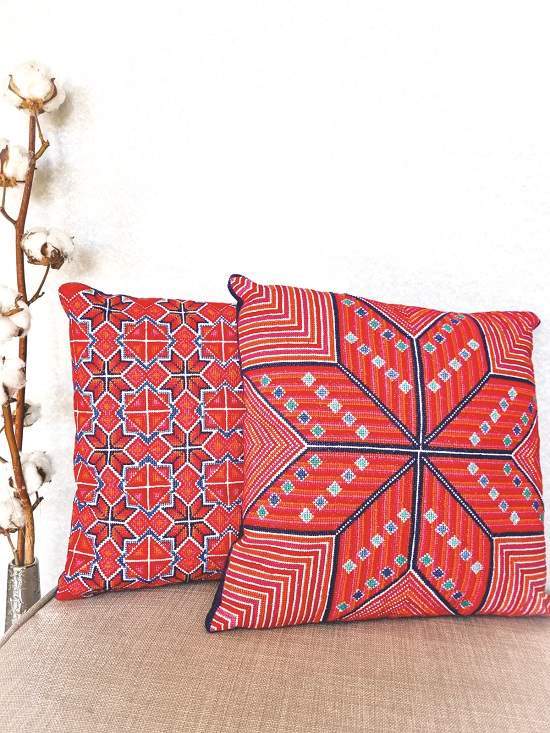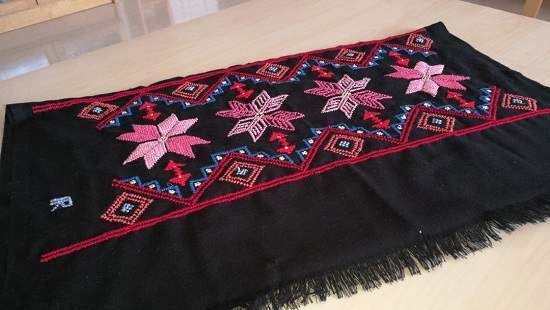AMMAN — Hiba Al-Rousan showed interest in embroidery from a young age, and she began practicing the craft since she was at school taking embroidery lessons in 2013. But a visit to Tiraz Center, a museum of traditional Arab dress and jewelry in 2014, gave her a historical context for this ancient craft and cemented her love for it.
اضافة اعلان
After graduating from university and joining the job market, Rousan still had plenty of free time which encouraged her to embroider pieces for herself and as gifts for people who shared her love for her artwork. In 2019, she launched her online store dubbed “Ghorzeh”.
“My friend told me about a shop that was looking to make scarfs in a different way, and she encouraged me to try. This was my first work and step by step my work took off,” Rousan, told
Jordan News in an interview.
She chooses the best quality materials in her work. She uses French-made DMC brand threads, known for its high-quality worldwide. “DMC threads are one of the best brands available in Jordan. I use two types of threads, ‘DMC thread floss’ and ‘DMC cotton parle’ as they keep their color even in the long term,” Rousan said.
 Embroidery pieces made by Hiba Al-Rousan. “Ghorzeh” is the online store that she founded to sell these pieces. (Photos: Ghorzeh)
Embroidery pieces made by Hiba Al-Rousan. “Ghorzeh” is the online store that she founded to sell these pieces. (Photos: Ghorzeh)
She gets her inspiration from books about embroidery, of which she has bought many. Two of these books are about Palestinian embroidery, which she describes as detailed encyclopedias about the craft, in addition to books on modern embroidery.
Rousan, through Instagram, discovered a “wide world” of people with similar interest in embroidery to her. “Seeing other people’s work encourages me to do better and keep my artwork unique,” she added. She also decided to embroider items other than clothes, since this seems to be the trend.
Rousan took courses to enhance her skills in the art of embroidery, mostly in modern embroidery, as she had a good grounding in traditional embroidery. She also tries to keep up with people outside Jordan, as different countries have their own techniques and traditions.
Ghorzeh’s artwork is distinguished from other embroidery products through the colors and combinations of colors, giving her work a touch of uniqueness. “When I first started traditional embroidery, I moved away from using red as it is a somewhat overused color,” Rousan said.
 Embroidery pieces made by Hiba Al-Rousan. “Ghorzeh” is the online store that she founded to sell these pieces. (Photos: Ghorzeh)
Embroidery pieces made by Hiba Al-Rousan. “Ghorzeh” is the online store that she founded to sell these pieces. (Photos: Ghorzeh)
She said that many houses in Jordan have a piece or more that include traditional embroidery as it is part of the culture. In order to preserve it, embroidery needs to be handmade, Rousan said so it doesn’t “lose its traditional vibes.”
“I know that we are living in the age of speed but there are things that do not have to change especially traditional embroidery,” she said.
Through “Ghorzeh”, she tries through her embroidery work to mark special events, she made pieces for Independence Day, as well as the latest developments in Palestine, and many others. “I wanted to reflect the idea that embroidery is not a thing to wear but can also support something or reflect the importance of some occasion,” Rousan said.
This year, she tried to make pieces that mark the major events that happened and the different months of the year. Each year she tries to set new goals, next year she plans to introduce new products.
What Rousan loves the most about embroidery is that she invests her time in a productive way while helping her meditate and relieve stress. “I find the process of producing artwork through embroidery delightful,” she said.
The majority of the feedback she got for her artwork has been positive, and she tries to be as flexible as possible with clients, making adjustments to pieces based on her client’s suggestions.
 Embroidery pieces made by Hiba Al-Rousan. “Ghorzeh” is the online store that she founded to sell these pieces. (Photos: Ghorzeh)
Embroidery pieces made by Hiba Al-Rousan. “Ghorzeh” is the online store that she founded to sell these pieces. (Photos: Ghorzeh)
Rousan used COVID-19 Pandemic lockdowns to enhance her skills and focus on embroidery. “I had some circumstances that forced me to stop doing my hobby, but COVID-19 encouraged me to come back again to what I love the most, it made me value my time more and not waist it,” she said.
Her sister, Sama Al Rousan, is a huge fan of “Ghrozeh’s” handmade products, and finds her work beautiful. “She gave traditional embroidery a modern look to fit modern styles, while maintaining the main concept. It changed the way we look at embroidery, and made people from different countries more aware of it,” her sister said.
Read more Culture and Arts



